2019英语四级语法精讲:原因状语从句
原因、结果、目的状语从句讲解和练习答案完美排版

Lesson 55-59状语从句总结一、原因状语从句(1)原因状语从句通常由because, since, as, for引导。
(2)because表示直接原因,语气最强。
because引导的原因状语从句多放在主句之后。
回答由why提出的问题,只能用because。
此外,because和so不能同用在一个句子里。
例如:------Why aren’t going there?------Because I don’t want to.since引导原因状语从句,相当于now that,意思是“因为……,既然……,鉴于……”。
例如:Since the rain has stopped,let’s go for a walk. 既然雨停了,我们出去散散步吧。
as和since语气较弱,一般用来表示明显的原因。
由as和since引导的原因状语从居多放在句首。
例如:As he has no car, he can’t get there easily.Since we have no money, we can’t buy it.(4)for表示所说的理由是一种补充说明,for引导的从句一般不放在句子的开头。
如:I decided to stop and have lunch, for I was feeling quite hungry.练习:I was late for class yesterday _______ there was something wrong with my bike.He took off his coat _______ he felt hot.you c an’t answer the question, I’ll ask someone else.二、结果状语从句(1)结果状语从句由so…that, such…that, so that引导。
(2)so…that语such...that可以互换。
英语语法大全之原因状语从句
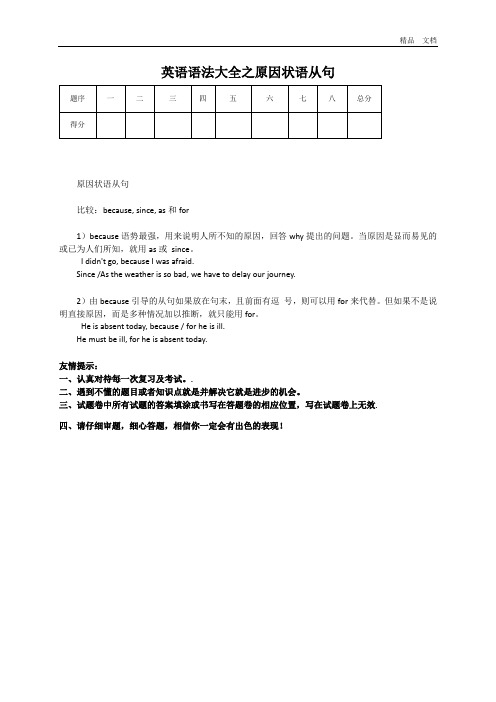
精品文档
英语语法大全之原因状语从句
原因状语从句
比较:because, since, as和for
1)because语势最强,用来说明人所不知的原因,回答why提出的问题。
当原因是显而易见的或已为人们所知,就用as或since。
I didn't go, because I was afraid.
Since /As the weather is so bad, we have to delay our journey.
2)由because引导的从句如果放在句末,且前面有逗号,则可以用for来代替。
但如果不是说明直接原因,而是多种情况加以推断,就只能用for。
He is absent today, because / for he is ill.
He must be ill, for he is absent today.
友情提示:
一、认真对待每一次复习及考试。
.
二、遇到不懂的题目或者知识点就是并解决它就是进步的机会。
三、试题卷中所有试题的答案填涂或书写在答题卷的相应位置,写在试题卷上无效.
四、请仔细审题,细心答题,相信你一定会有出色的表现!。
原因状语从句语法讲解

原因状语从句语法讲解以下是原因状语从句的语法讲解:1.引导词:原因状语从句通常由以下引导词引导:- because(因为)- since(因为,自从)- as(因为,既然)- as a result of(由于)- due to(由于)- owing to(由于)- now that(既然)2.引导词用法:- because和since通常表示明显的原因,语义上较强,可以置于句首或句尾。
例如:He is crying because he lost his toy.(他哭了,因为他丢了他的玩具。
)- as表示理由,常不置于句首,一般位于句中或句尾。
例如:Helikes soccer as he enjoys playing with his friends.(他喜欢足球,因为他喜欢和朋友一起玩。
)- as a result of、due to、owing to表示结果或原因,一般置于句首。
例如:As a result of the rain, the game was canceled.(由于下雨,比赛被取消了。
)- now that表示既然,常置于句首。
例如:Now that you have finished your homework, you can go out and play.(既然你已经做完作业了,你可以出去玩了。
)3.句子结构:- 原因状语从句通常由主语、谓语和宾语等组成,可以包含其他从句。
例如:He is sad because he failed the test yesterday.(他因为昨天考试没及格而感到难过。
)- 状语从句的主谓结构与主句的一致。
例如:I can't go to the park because it is raining.(因为正在下雨,所以我不能去公园。
)。
英语四级语法精讲 状语从句(1)

英语四级语法精讲状语从句(1)大学英语四级考试涉及的语法知识点多、涉及面宽,对不少考生来说都是一个难题。
希望通过本专题的学习,考生能对四级语法有更全面的掌握!状语从句状语从句:两个独立的句子中间用一些含义不同的连接词连接;状语从句用来表达两个句子之间的逻辑关系;分成原因状语、条件状语、结果状语、时间状语、地点状语、让步状语、目的状语、比较状语、方式状语等九大类型;eg:I got up late.I was late for school.Because I got up late, I was late for school. (原因状语从句)I got up late,so I was late for school. (结果状语从句)1. 地点状语:地点状语从句通常由where,wherever,everywhere 引导;eg:Where I live there are plenty of trees.Wherever you work, you will gain much valuable experience as long as you are willing to work.Wherever=no matter whereEverywhere they went, they were warmly received.Where there is a will, there is a way.where:不能翻译成在……地方时,通常翻译为如果,表示在……条件下;eg: Where you are confident,you will succeed.eg:Where previously the bank had concentrated on the big infrastructure projects , such as dams, roads and bridges,it begin to switch to projects which directly improved the basic services of a country.concentrated on :集中于……。
英语原因状语从句

英语原因状语从句
英语中的原因状语从句用来表示件事情发生的原因或理由。
在原因状
语从句中,常常使用以下引导词:
1. because: 因为
2. since: 因为
3. as: 由于;因为
4. given that: 鉴于;由于
5. seeing that: 鉴于;由于
6. considering (that): 考虑到;鉴于
7. due to: 由于;因为
8. owing to: 由于;因为
例如:
- Since it's raining outside, we should bring umbrellas. (由
于外面在下雨,我们应该带雨伞。
- As he had already left, I couldn't give him the message. (由于他已经离开了,所以我不能给他传达消息。
)
- Given that it's late, we should go home now. (鉴于已经很晚,我们现在应该回家了。
)
- Considering the price, this car is a good deal. (考虑到这
个价格,这辆车是个不错的交易。
)
- Due to bad weather, the flight was cancelled. (由于恶劣的
天气,航班被取消了。
)
- Owing to his hard work, he was promoted. (由于他的努力工作,他得到了晋升。
原因状语从句知识讲解

1、定义:在句中用来说明主句原因的句子叫原因状语从句。
2、常用引导词: because(因为), as (由于), since (既然), now (that) (既然)3、时态:原因状语从句一般都是根据实际情况选用适当的时态。
通常是主过从过,主现从现。
4、because, since和as的区别:1) because引导的原因状语从句一般放于主句的后面,because从句位于句首时要用逗号分开,放在句末时,可不用逗号分开。
because表示直接原因,语气最强,最适合回答why引导的疑问句。
because of 也表示原因,但它后面不接从句, 只能接名词, 代词或动名词。
注意:because 和so 不可同时出现在一个句子里。
①I do it because I like it. = I like it so I do it.②We went by bus because it was cheaper. = It was cheaper so we went by bus.③He can’t go to school because of his illness.2) since引导的原因状语从句一般放于主句之前表示已知的、显然的理由(通常被翻译成“既然”= now that ),较为正式,语气比because弱。
①Since you are free today, you had better help me with my mathematics.②Since you don't trust him, you should not employ him.③Now (that) you are grown up, you should not rely on your parents.3) as引导原因状语从句时表示附带说明的“双方已知的原因”,含有对比说明的意味,语气比since弱,较为正式,位置较为灵活(常放于主句之前)。
原因状语从句的用法
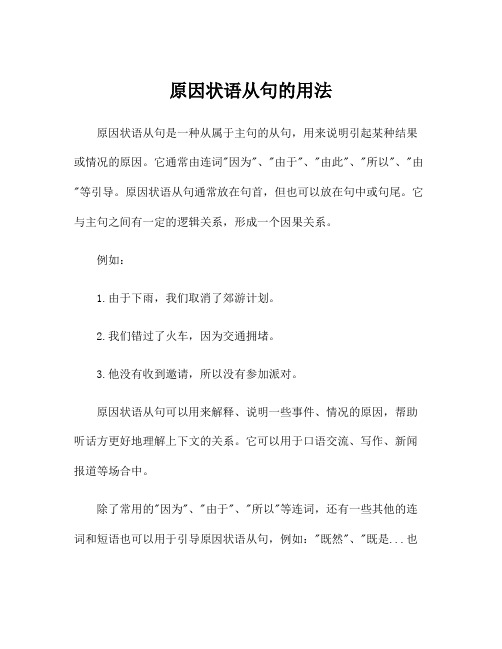
原因状语从句的用法
原因状语从句是一种从属于主句的从句,用来说明引起某种结果或情况的原因。
它通常由连词"因为"、"由于"、"由此"、"所以"、"由"等引导。
原因状语从句通常放在句首,但也可以放在句中或句尾。
它与主句之间有一定的逻辑关系,形成一个因果关系。
例如:
1.由于下雨,我们取消了郊游计划。
2.我们错过了火车,因为交通拥堵。
3.他没有收到邀请,所以没有参加派对。
原因状语从句可以用来解释、说明一些事件、情况的原因,帮助听话方更好地理解上下文的关系。
它可以用于口语交流、写作、新闻报道等场合中。
除了常用的"因为"、"由于"、"所以"等连词,还有一些其他的连词和短语也可以用于引导原因状语从句,例如:"既然"、"既是...也
是..."、"出于"、"由此可见"等。
这些连词和短语在句子中的位置和语态可能有所变化,但作用都是引导原因状语从句。
要特别注意的是,原因状语从句使用的时态应根据主句的时态和语境来确定。
如果主句是过去时,则原因状语从句多使用过去时。
如果主句是现在时,则原因状语从句可以使用现在时,过去时或可能将来时,视具体情况而定。
总的来说,原因状语从句的用法很灵活,可以在句子中起到连接主句与状语从句的作用,并帮助读者或听众更好地理解句子的含义和逻辑关系。
原因、目的、结果状语从句

三、结果状语从句通常由连词so…that, such…that引导。二
者都表示“如此…以至于”之意。 例: 1) The teacher’s teaching was so interesting that all the students were very excited. 老师讲课非常有趣,学生们都感到很兴奋。 2) Jack studies so hard that he always makes progress. 杰克学习很是努力,结果他不断取得进步。 3) It’s such a nice day that all of us want to go camping. 天气是如此的好,我们大家都想去野营。
since语气较弱。它所引导的从句一般放在主句之前,意为
“既然”;就对方陈述的事实作为理由。 例: 1) Since Li Ming doesn’t know the answers to the problems, let’s ask Wang Lei to do it. 既然李明不知道这道题的答案,那就让王磊来回答吧。 2) Since we are good friends, please call me if you need help. 既然我们是好朋友,如需要帮助,请尽管打电话。
●
so …that … 与such … that…的用法区别: so + 形容词或副词 + that + 从句 such + 形容词+a(an) + 单数可数名词 + that +从句。但 是这两种句型往往可以互换。 例: 1) My grandfather is so kind that everyone likes talking with him. (= My grandfather is such a kind person that everyone likes talking with him) 我爷爷心地善良,大家都喜欢和他聊天。 2) It is so cold that I have to wear warm clothes. (= It is such cold weather that I have to wear warm clothes.) 天气如此的冷,以至于我不得不穿上暖和的衣服。
原因状语从句精讲

原因状语从句精讲1.引导原因状语从句的连词有:because,since,as,now that,seeing that,considering that等。
(1)because 语气最强,表示必然的因果关系。
I was absent from the meeting because I was ill.我缺席会议了,因为我生病了。
(2)since语气稍弱,表示对方已知晓的原因或事实,意为“既然;由于”。
Since everybody is here,let's begin our meeting.既然大家都到场了,我们开始开会吧。
(3)as语气最弱,往往是不明显的原因,只是对结果的附带说明。
As it is raining,we shall not go to the park.因为下雨了,所以我们不能去公园。
(4)considering (that),seeing (that),now(that)和since的意义相似,都有“鉴于某个事实”的意思,that可以省去。
Considering (that)everybody is here,let's begin our discussion.鉴于大家都到场了,我们开始讨论吧。
Now(that)you have grown up,you should not rely on your parents.鉴于你已经长大成人,你不应该依赖你父母了。
2.其他表示原因的方式除了状语从句外,一些介词短语同样可以表示原因,这样的短语有:because of,thanks to,due to,owing to等。
Because of the weather,we had to put off the sports meeting.由于天气原因,我们不得不推迟运动会。
语法中的原因状语从句

语法中的原因状语从句在语法中,原因状语从句是一种用来表达原因或因果关系的从句。
它可以帮助我们更准确地表达出某个事件或行为的原因。
本文将详细介绍原因状语从句的定义、结构、用法和例句,并说明如何正确运用原因状语从句来增强句子的逻辑性和表达能力。
一、定义原因状语从句,顾名思义,是用来表达事件或行为的原因的从句。
它通过回答“为什么”来解释某个行为或现象产生的原因。
二、结构原因状语从句一般由连词“因为”、“由于”、“既然”等引导,接在主句之后。
从句通常位于主句之后,对主句进行解释。
三、用法原因状语从句常用于复合句中,可以起到进一步解释句意的作用。
以下是一些常见的用法:1. 表示原因:他迟到了,因为他睡过头了。
他参加了培训班,由于他想提升自己的职业技能。
2. 引出解释:他没参加派对,是因为他不喜欢人群拥挤的场合。
她早退了,既然她生病了。
3. 表达原因假设:如果你不理解这个概念,那是因为你没有详细阅读说明书。
要想保持健康的身体,必须定期锻炼,因为运动有助于增强免疫力。
四、使用注意事项在使用原因状语从句时,需要注意以下几点:1. 识别引导词:例如“因为”、“由于”、“既然”等,这些词往往是引导原因状语从句的信号词。
2. 注意时态和语态:原因状语从句通常与主句保持一致的时态和语态。
3. 避免使用短语:原因状语从句应该是一个完整的句子,避免使用短语或单个词作为原因状语。
4. 注意逻辑关系:原因状语从句应该与主句之间有明确的逻辑关系,确保表达的原因与所述的行为或事件相符。
五、例句为了更好地理解原因状语从句的用法,以下是一些例句:1. 他没来上课,因为他生病了。
2. 他退学了,是因为他找到了一份全职工作。
3. 我决定留下来,因为我觉得这个城市很适合我。
4. 这个项目失败了,是因为缺乏足够的资金支持。
六、总结通过使用原因状语从句,我们可以更准确地表达行为或事件的原因。
在使用原因状语从句时,我们需要注意引导词的选择、时态和语态的一致性,以及与主句之间的逻辑关系。
because原因状语从句用法

because原因状语从句用法
"because"引导的原因状语从句可以用来说明一个事件发生的原因。
通常,原因状语从句放在主句之前,可以用不同的句型来表达。
1.因为句子:原因状语从句作为句子的开头,与主句用逗号隔开。
例如:Because it was raining, we stayed indoors.
2.主从句倒装:原因状语从句放在主句之后,主句的主语和谓语动词要倒装。
例如:We stayed indoors because it was raining.
3.用作插入语:原因状语从句可以插入主句中,用逗号或者破折号隔开。
例如:We stayed indoors, because it was raining.
We stayed indoors – because it was raining.
需要注意的是,原因状语从句中的动词形式要使用主句的时态,因为原因发生在主句之前。
2019年12月英语四级语法复习知识点:原因状语从句

2019年12月英语四级语法复习知识点:原因状语从句原因状语从句连接词:because,since,as,for,now that,in that,owing to,due to,thanks to,because of,as a result of;比较:because,since,as和for1)because语势,用来说明人所不知的原因,回答why提出的问题。
当原因是显而易见的或已为人们所知,就用as或 since。
I didn't go, because I was afraid.Since /As the weather is so bad, we have to delay our journey.2)由because引导的从句如果放在句末,且前面有逗号,则能够用for 来代替。
但如果不是说明直接原因,而是多种情况加以推断,就只能用for。
He is absent today, because / for he is ill.He must be ill, for he is absent today.now that :既然;in that :因为,通常只能放在句中,强调重要的,的的原因;eg:Now that this semester is finished, I am going to rest a few days and take a trip.Human beings are different from animals in that human can speak and think.owing to, due to, thanks to, because of , as a result of等短语后面只能接词或短语,不能接从句。
英语语法原因状语从句用法说明

英语语法原因状语从句用法说明英语语法原因状语从句用法说明原因状语从句主要的有because, as, since, seeing (that), now (that), considering (that) 等。
如:1. 由because引导He couldn’t get to school because he hada cold. 他因患感冒而未能去上学。
I can’t take the examination because I am ill. 我不能参加考试因为我生病了。
He distrusted me because I was new. 他不信任我是因为我是新来的`。
Because I worked fast, I finished early. 因为我干得快,所以我完成得早。
They can’t have gone out because the light’s on. 他们不可能出去了,因为灯还亮着。
He could not concentrate because the room was noisy. 他不能集中思想,因为房里太吵。
I read no further than the caption because the subject of the article seemed uninteresting. 我只看了标题,因为文章题目似乎不引人兴趣。
I could have gone with you because I was there at that time. 我本来可以和你一道去的,因为那时我也在那里。
2. 由as引导As all the seats full I stood up. 因为所有座位都有人,我就站了起来。
As it’s raining, we’ll have to stay at home. 因为天下雨,我们得待在家里。
As all the seats were full he stood up. 由于所有座位都有人了,他站了起来。
原因状语从句

原因状语从句Company number:【WTUT-WT88Y-W8BBGB-BWYTT-19998】二、原因状语从句:1、定义:在句中用来说明主句原因的句子叫原因状语从句。
2、常用引导词: because(因为), as (由于), since (既然), now (that) (既然)3、时态:原因状语从句一般都是根据实际情况选用适当的时态。
通常是主过从过,主现从现。
4、because, since和as的区别:1) because引导的原因状语一般放于主句的后面,because从句位于句首时要用逗号分开,放在句末时,可不用逗号分开。
because表示直接原因,语气最强,最适合回答why引导的。
because of 也表示原因,但它后面不接从句, 只能接名词, 代词或动名词。
注意:because 和so 不可同时出现在一个句子里。
①I do it because I like it. = I like it so I do it.②We went by bus because it was cheaper. = It was cheaper so we went by bus.③ He can’t go to school because of his illness.2) since引导的原因状语一般放于主句之前表示已知的、显然的理由(通常被翻译成“既然”= now that ),较为正式,语气比because弱。
①Since you are free today, you had better help me with my mathematics.②Since you don't trust him, you should not employ him.③Now (that) you are grown up, you should not rely on your parents.3) as引导原因状语时表示附带说明的“双方已知的原因”,含有对比说明的意味,语气比since弱,较为正式,位置较为灵活(常放于主句之前)。
【英语】英语语法之:?原因状语从句
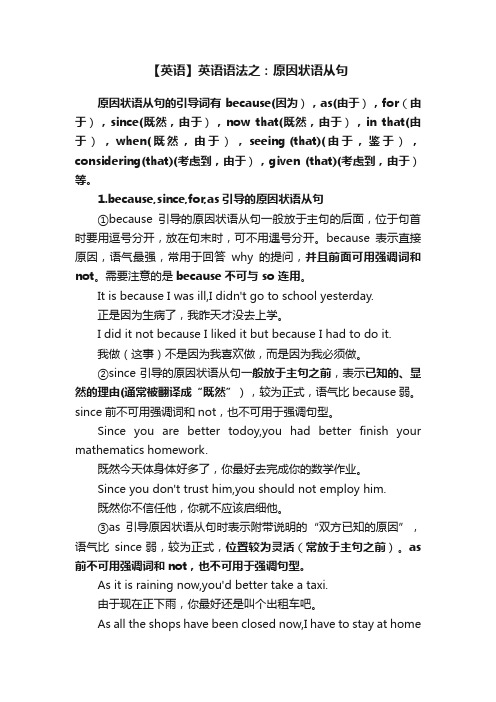
【英语】英语语法之:原因状语从句原因状语从句的引导词有because(因为),as(由于),for(由于),since(既然,由于),now that(既然,由于),in that(由于),when(既然,由于),seeing (that)(由于,鉴于),considering(that)(考虑到,由于),given (that)(考虑到,由于)等。
1.because,since,for,as引导的原因状语从句①because引导的原因状语从句一般放于主句的后面,位于句首时要用逗号分开,放在句末时,可不用遇号分开。
because表示直接原因,语气最强,常用于回答why的提问,并且前面可用强调词和not。
需要注意的是because不可与 so 连用。
It is because I was ill,I didn't go to school yesterday.正是因为生病了,我昨天才没去上学。
I did it not because I liked it but because I had to do it.我做(这事)不是因为我喜欢做,而是因为我必须做。
②since引导的原因状语从句一般放于主句之前,表示已知的、显然的理由(通常被翻译成“既然”),较为正式,语气比because 弱。
since前不可用强调词和not,也不可用于强调句型。
Since you are better todoy,you had better finish your mathematics homework.既然今天体身体好多了,你最好去完成你的数学作业。
Since you don't trust him,you should not employ him.既然你不信任他,你就不应该启细他。
③as引导原因状语从句时表示附带说明的“双方已知的原因”,语气比since 弱,较为正式,位置较为灵活(常放于主句之前)。
原因状语从句(完整)

原因状语从句(完整)
原因状语从句是一种从句,用来表示某种事件或情况的原因。
它通常由“因为”、“既然”、“由于”、“如果”等引导词开头,以下是一些常用的原因状语从句及其用法:
1.因为(because)
用法:因为引导的原因状语从句可以放在句首或句中,用来解释主句中的原因。
例句:因为他昨晚没睡好,今天一整天都很疲倦。
2.既然(since)
用法:既然引导的原因状语从句表示相信某个前提条件,因此陈述主句中的结果或结论。
例句:既然你已经完成了这项工作,我们就可以开始进行下一步了。
3.由于(due to)
例句:由于天气不好,我们无法进行户外活动。
4.如果(if)
例句:如果你需要帮助,尽管告诉我,我很乐意为你效劳。
5.只要(as long as)
例句:只要你好好学习,你就会成功。
6.尽管(even though)
例句:尽管天气不好,但我们仍然决定继续我们的计划。
7.虽然(although)
用法:虽然引导的原因状语从句表示一个与主句相反的情况,用来表达抱怨、惊讶等情绪。
例句:虽然我跟他说了很多遍,但他还是不肯听我的建议。
8.随着(as/with)
例句:随着科技的进步,我们的生活变得越来越便利。
总之,原因状语从句是一种非常重要的语法结构,它可以表达出各种事件或情况的原因,让句子的意思更加清晰明了。
希望通过以上的例句和用法介绍,能够帮助大家更好地掌握原因状语从句的用法。
原因状语从句
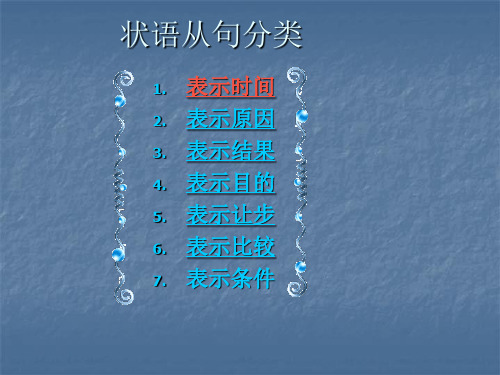
2. This TV set is too dear,
___D_ it gives you a better picture.
A. or B. and C. if D. though 3. ___C_ he is very young, ____ he knows several language A. Though; but B. Because; so C. Though; / D. Because; /
It rained last night, for the ground is
wet this morning.
注意:汉语习惯上说“因为…… 所以”,但英语却不能将because, since, as, for等与so(所以)连用。
二:结果状语从句
定义:表示由某个行为而导致的结果 引导词: so so...that, such...that
•2.such+形容词+复数名词/不可数名词 •+that
Our town has such fresh air that every visitor wants to come.
1.so+形/副+that
2.so+形容词+a(an)+单数名词+that
3.so+many/few/much/little+复数 名词(不可名)+that
As it is raining, you’d better take a taxi. 既然在下雨, 你最好乘出租汽车。
I went to bed early, as I was very tired. 我睡得早, 因为我筋疲力尽了。
原因状语从句语法讲解

A、引导原因状语从句的连词原因状语从句一般由从属连词because, as, since,now that引导。
B、because, as, since和now that的区别:1、because“因为”,表示直接的原因,语气最强。
1)why提问的句子,必须用because回答。
2)because的从句常放在主句之后。
3)because 不能与so连用。
4)because+ 从句;because of+ 名词短语I missed the train because I got up late.He was angry not because we were late but because we made a noise.-Why didn’t he come yesterday -Because he was ill.2、as“因为”,语气较弱,一般放在主句前,中间用逗号隔开,表示的是明显的原因。
As he was not well, I decided to go there without him.As it was raining hard, we had to be indoors.3、since/ now that“既然”,一般放在主句前,中间用逗号隔开,表示的是明显的原因或众所周知的事实。
Since/ Now that this method doesn’t work, let]s try another.Since/ Now that you feel ill, you'd better not go to work.C、for 引导的并列句与原因状语从句的辨析并列连词for“因为”,引导的不是从句,而是并列分句,只能放在主句之后,不能放在句首,常用逗号把它和前面的分句隔开。
对主句补充说明理由或推断原因。
It rained last night, for the ground is wet.She must have gone out early, for she had not come for breakfast.Exercise:一、填入恰当的连词1. I didn’t go to school yesterday _________ I was ill.2. ________ everybody is here, let’s begin our meeting.3. ________ you are in poor health, you should not stay up late.4. I asked her to stay to tea, ________ I had something to tell her.5. ________ all the passengers are here, why don’t we start at once6. Bill won’t make any progress ________ he doesn’t study harder than before.7. He might have gone to bed, ________ the light went out.二、改写句子,保持句意不变1) The ship changed its course because there was a storm.The ship changed its course _______ _______ _______ _______.2) Because he was ill, he didn’t go to school.He was ill, _______ he didn’t go to school.3) He couldn't walk because his leg was broken.He couldn't walk ______ ______ his ______ leg.4) I came back because it was raining heavily.I came back ______ ______ the ______ rain.三、课堂小结:______________________________________________________________________________ _______________________________________________________________________________ _______________________________________________________________________________ _______________________________________________________________________________ _四、回家作业:一、填入恰当的连词1. ______ you do not understand, I will explain again.2. ______ Jane was the oldest in this family, she had to look after the others.3. He must be ill, ______ he is absent today.4. The teacher must be strict with you ______they want you to make great progress.5. _____your father is well again, you no longer have anything to worry about.6. The day breaks, _____the birds are singing.7. ______ you are ill, you’d better go to see the doctor.8. ______ she was late for class, she had to say sorry.二、选择恰当的答案1. The man can’t get on the bus ______ there is no room on it.A. thoughB. becauseC. until D so that2. ______ her daughter hadn’t come back, ______ she looked worried.A. Because, /B. Because, soC. Though, butD. Though, /you’ve got a chance, you might make full use of it.A. Now thatB. AfterC. AlthoughD. As soon as4. He found it difficult to read, _______ his eyesight was beginning to fail.A. andB. forC. butD. or5. A man cannot smile like a child, ________ a child smiles with his eyes, whilea man smiles with his lips alone.A. soB. butC. andD. for五、学生反馈:(在完成回家作业的过程中存在的问题)______________________________________________________________________________ _______________________________________________________________________________ _______________________________________________________________________________ _______________________________________________________________________________ _六、教师反馈:(在批改学生回家作业中发现的问题)______________________________________________________________________________ _______________________________________________________________________________ _______________________________________________________________________________ _______________________________________________________________________________ _Keys:A、引导原因状语从句的连词:because, as, since,now thatB、because, as, since和now that的区别:1、because:“因为”,表示直接的原因,语气最强。
原因状语从句

原因状语从句原因状语从句是复合句中的一种从句结构,通常用来表示某个动作或事件发生的原因。
在语法上,原因状语从句由一个引导词引导,这个引导词可以是because, since, as, for等。
原因状语从句在句子中起到解释、说明某个动作或者事件发生原因的作用。
下面将从原因状语从句的定义、用法、引导词以及一些例句来详细介绍原因状语从句。
一、定语从句概述原因状语从句(adverbial causal clause)是由从属连词because, since, as, for等引导的从句,用来表示一个动作或事件发生的原因。
在使用原因状语从句时,需要注意主句和从句之间的时态一致性,以及从句中是否需要倒装。
此外,在选择引导词时,需根据具体语境和句意进行选择。
二、原因状语从句的用法原因状语从句通常放在句子的首位或末位,用于解释某一行为或事件发生的原因。
它可以对一个事实进行推理或解释,使整个句子更加具有说服力。
三、原因状语从句的引导词1. becausebecause是最常用的原因状语从句引导词,用来表示直接的原因。
例如:- I couldn't attend the meeting because I had a doctor's appointment.(因为我有个医生预约,我无法参加会议。
)2. sincesince也是一个常见的原因状语从句引导词,用来表示过去的原因或已知的原因。
例如:- Since it was raining heavily, we decided to stay at home.(由于雨下得很大,我们决定待在家里。
)3. asas可以用来引导原因状语从句,表示正式和书面的语气。
例如:- As I was feeling tired, I went to bed early.(由于我感到疲倦,我早早上床休息了。
)4. forfor用来引导原因状语从句时,通常用于强调和解释前面所提到的原因。
原因状语从句英语
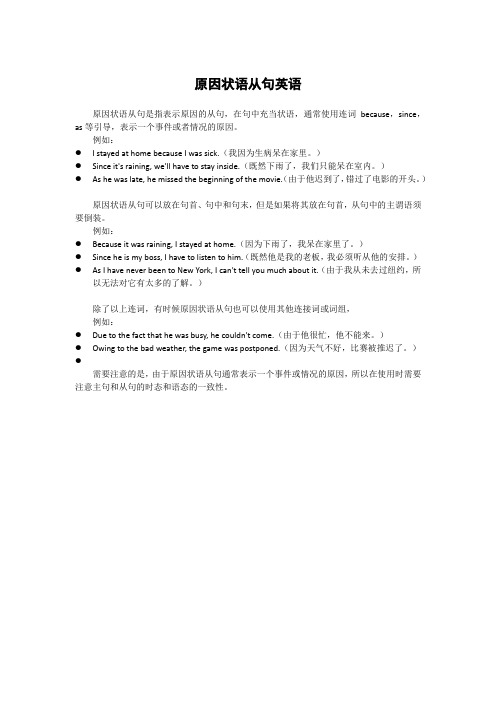
原因状语从句英语原因状语从句是指表示原因的从句,在句中充当状语,通常使用连词because,since,as等引导,表示一个事件或者情况的原因。
例如:●I stayed at home because I was sick.(我因为生病呆在家里。
)●Since it's raining, we'll have to stay inside.(既然下雨了,我们只能呆在室内。
)●As he was late, he missed the beginning of the movie.(由于他迟到了,错过了电影的开头。
)原因状语从句可以放在句首、句中和句末,但是如果将其放在句首,从句中的主谓语须要倒装。
例如:●Because it was raining, I stayed at home.(因为下雨了,我呆在家里了。
)●Since he is my boss, I have to listen to him.(既然他是我的老板,我必须听从他的安排。
)●As I have never been to New York, I can't tell you much about it.(由于我从未去过纽约,所以无法对它有太多的了解。
)除了以上连词,有时候原因状语从句也可以使用其他连接词或词组,例如:●Due to the fact that he was busy, he couldn't come.(由于他很忙,他不能来。
)●Owing to the bad weather, the game was postponed.(因为天气不好,比赛被推迟了。
)●需要注意的是,由于原因状语从句通常表示一个事件或情况的原因,所以在使用时需要注意主句和从句的时态和语态的一致性。
- 1、下载文档前请自行甄别文档内容的完整性,平台不提供额外的编辑、内容补充、找答案等附加服务。
- 2、"仅部分预览"的文档,不可在线预览部分如存在完整性等问题,可反馈申请退款(可完整预览的文档不适用该条件!)。
- 3、如文档侵犯您的权益,请联系客服反馈,我们会尽快为您处理(人工客服工作时间:9:00-18:30)。
2019英语四级语法精讲:原因状语从句
原因状语从句
连接词:because,since,as,for,now that,in that,owing to,due to,thanks to,because of,as a result of;
比较:because,since,as和for
1)because语势,用来说明人所不知的原因,回答why提出的问题。
当原因是显而易见的或已为人们所知,就用as或 since。
I didn't go, because I was afraid.
Since /As the weather is so bad, we have to delay our journey.
2)由because引导的从句如果放在句末,且前面有逗号,则能够用for 来代替。
但如果不是说明直接原因,而是多种情况加以推断,就只能
用for。
He is absent today, because / for he is ill.
He must be ill, for he is absent today.
now that :既然;
in that :因为,通常只能放在句中,强调重要的,的的原因;
eg:Now that this semester is finished, I am going to rest a few days and take a trip.
Human beings are different from animals in that human can speak and think.
owing to, due to, thanks to, because of , as a result of等短
语后面只能接词或短语,不能接从句。
